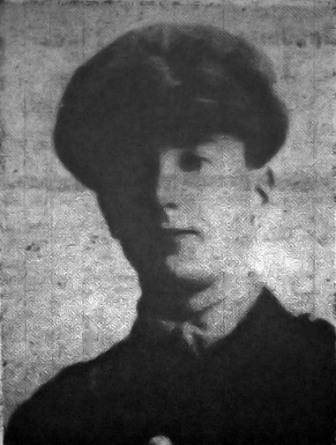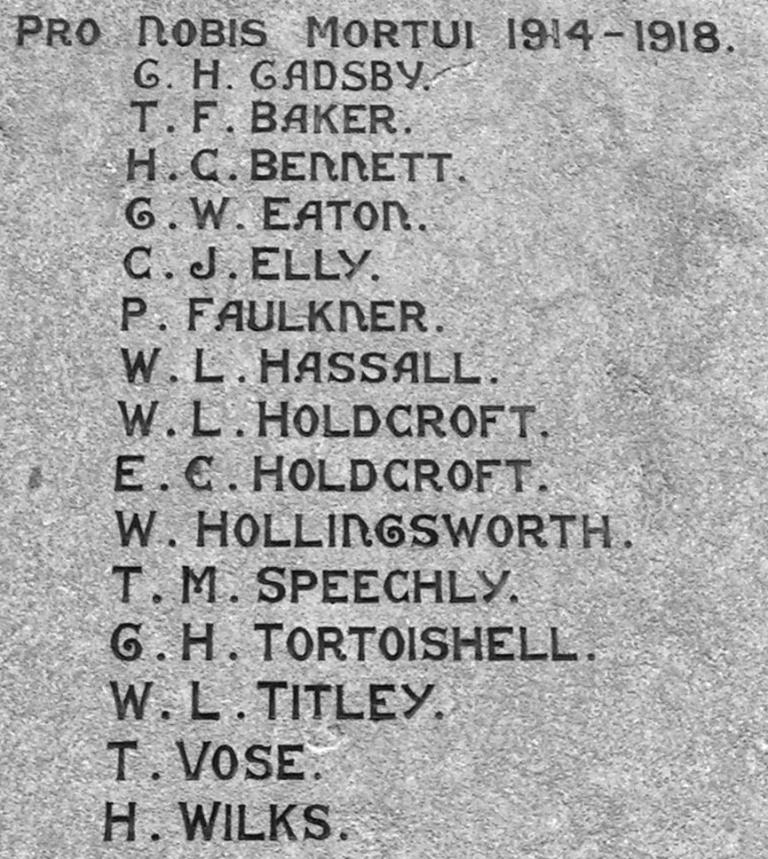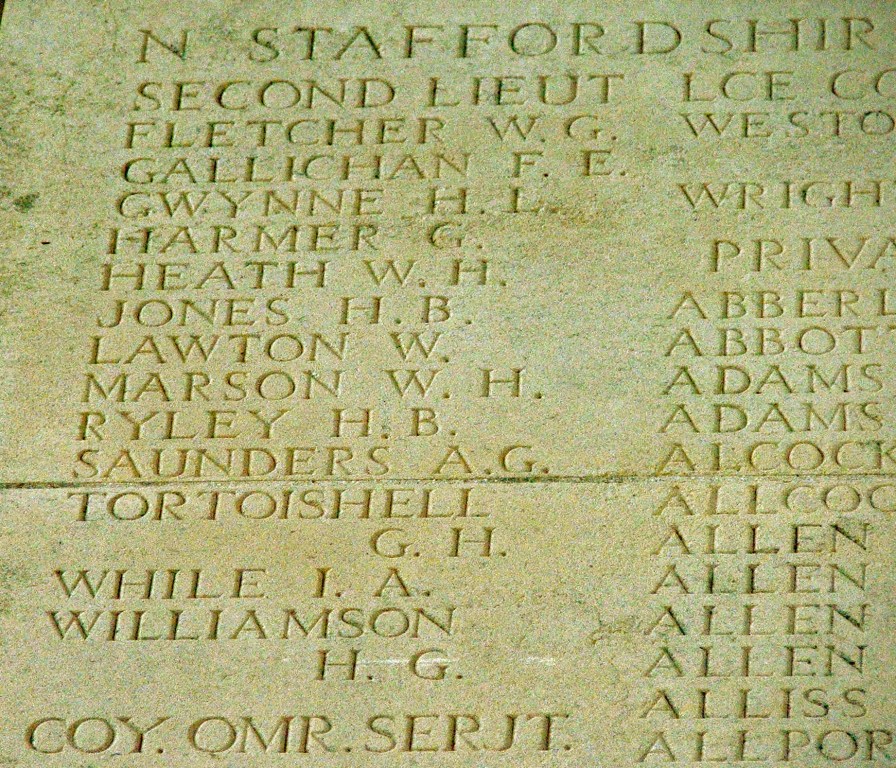
TORTOISHELL, GEORGE HENRY ("Harry")

[Photograph with kind permission from the Uttoxeter Advertiser]
|
|
Source |
||||
|
CWGC |
SDGW |
Uttoxeter Advertiser |
Other |
||
|
Parents |
Mr. G. H. Tortoishell (Headmaster of Bradley Street School, Uttoxeter, Staffordshire) |
|
Does not appear in the database |
2d |
1 |
|
Mr. G. H. Tortoishell |
|
2c |
|
||
|
Where born |
|
|
|
|
|
|
When born |
1888 or 1889 |
|
|
4 |
|
|
Position in the family |
Only son |
|
2c, 2d |
1 |
|
|
Address |
Parents: Derby Road, Uttoxeter |
Yes |
|
1 |
|
|
Self: Staines, Middlesex |
|
|
1 |
||
|
Where educated |
Bradley Street School, Uttoxeter |
|
2d |
|
|
|
Thomas Alleyne’s Grammar School, Uttoxeter |
|
2d |
1 |
||
|
Oxford University |
|
2d |
|
||
|
King’s College, London |
|
2d |
|
||
|
Spouse |
|
|
|
|
|
|
Children |
|
|
|
|
|
|
Employment Before Joining up |
Messrs. Laughton and Co., publishers and advertising agents in London |
|
|
|
|
|
Where enlisted |
|
|
|
|
|
|
When he went abroad |
December 1914 |
|
2c, 2e |
1 |
|
|
Regiment |
Outbreak of war: Honourable Artillery Company- 1st Bn |
|
2c, 2e |
1 |
|
|
At the time of his death: North Staffordshire (Prince of Wales’s) |
Yes |
2e |
|
||
|
Unit |
1st/5th Bn., "D" Coy. |
Yes |
|
|
|
|
1/5th (T.F.) Bn |
|
|
1 |
||
|
Rank |
2nd Lieutenant |
Yes |
2c, 2d, 2e |
|
|
|
Lieutenant |
|
2b |
|
||
|
Service Number |
|
|
|
|
|
|
Date of Death |
14 March 1917 |
Yes |
2c, 2d |
|
|
|
Age at time of death |
28 |
Yes |
2d |
|
|
|
Where Killed or died |
Somme |
|
|
|
|
|
Near Bucquoy |
|
2e |
|
||
|
Bucquoy |
|
|
1 |
||
|
How he died |
Killed in Action – shot through the head while leading a night attack |
|
Yes |
1 |
|
|
Killed in Action while leading his platoon near Bucquoy |
|
2e |
|
||
|
Killed in Action – shot through the head and died instantly |
|
2d |
|
||
|
Location of Grave or Memorial |
Thiepval Memorial for the Missing Pier and Face 14 B and 14 C. |
Yes |
|
|
|
|
Uttoxeter Town War Memorial (Market Place) |
|
|
1, 3 |
||
|
Thomas Alleyne’s School War Memorial, Uttoxeter |
|
|
1,3 |
||
|
Awards |
|
|
|
|
|
Harry was the only son and his father was a headmaster of Bradley Street School, Uttoxeter[1]. He was educated in his father's school at Uttoxeter and then at Alleyne’s Grammar School.
|
|
 |
|
The school’s war memorial |
|
When he left Alleyne’s Grammar School he went up to Oxford, where he gained a degree[2d]. He then spent between 2 and 3 years at King's College, London, before taking up an appointment with Messrs. Laughton and Co., publishers and advertising agents in London[2d]. He was still with the firm at the time of mobilisation and ‘held in the highest esteem by the responsible heads for his integrity and upright qualities, the bright anticipations of his mentors in his boyhood days being realised to the full in his business life’[2d].
He was in the Honourable Artillery Company on the outbreak of war[1, 2c] and immediately mobilised with his Company[2c], which means that he was one of the special band of ‘Old Contemptibles’. He went to France with the 1st Battalion, Honourable Artillery Company, on the 26th of December 1914[1]. This, of course, means that there is a possibility that he may have taken part in the Christmas Truce of 1914, but we need to confirm this from the regimental records.
By December 1914 he was at the front and from then onwards, apart from short leaves, he was in the thick of the fighting[2c]. This meant that he was engaged in fighting in Flanders and elsewhere when his regiment sustained severe losses, particularly in the opening stages of the war[2c].
In January 1915 the Uttoxeter Advertiser published an extract from a letter he had sent to thank the townsfolk of Uttoxeter for a Christmas parcel they had sent him[2a]. This letter gives an insight to Harry’s view on being at the front:
“I much appreciate your kind thought of me as one of Uttoxeter’s Tommies, and from my side should like to assure you of my continued loyalty to the old town, where I spent my younger days so happily. Those of us who have the privilege to be out here will be thinking of home and friends, especially during Christmas-time, and gladly would be with you were not that there is a job to be done, and it is up to all of us who can do our bit, however long and unpleasant it may be...”
He was wounded on the 16th of June 1916[1], but we do not know details, and was promoted to Lance-Corporal on the 1st of October 1915[1].
In the winter of 1916, Lt. Tortoishell the Uttoxeter Advertiser published a letter he had sent to thank the townspeople for socks that they had sent to his men[1, 2b]:
"Can you permit me a small space in your paper that I may thank the ladies and friends of the St. John Ambulance Brigade for the work and expense they have devoted to the supply of socks for our men in the trenches. In the present severe weather conditions dry socks are most welcome. I have personally distributed the socks so kindly forwarded by Miss Smith, and I can assure you they have been greatly appreciated by the recipients.".
Harry was talented and demonstrated qualities that were recognised by his commanders. He was promoted through the ranks and sent to Cadet School in quick succession.
He was promoted to Corporal on the 19th of February 1916[1] and Lance-Sergeant on the 18th of August 1916[1]. He served for a period as sergeant-instructor to a corps of officers in France[2c] and then accepted a commission, which resulted in his being promoted to Lieutenant.
He went to Cadet School on the 11th of September 1916[1] and was commissioned as a 2nd Lieutenant [1] on the 12th of November 1916[1].
Until he received his fatal wound he seemed to lead a charmed life, because although he had many hair-breadth escapes and minor injuries, he was never seriously hurt[2c].
His obituary in the Uttoxeter Advertiser[2c] described him as a fine type of the cream of the British Army – morally and physically – and he was held in high estimation by those in authority.
In the last letters received from him it was evident that his Company had been involved in some very stiff fighting, but he was full of confidence for the future and spoke with glowing pride of the brave work of his fellow officers and the men of his platoon[2d].
The Uttoxeter Advertiser quoted from a letter written about the death of Captain S. B. Wilton, who was Harry’s Company Commanding Officer[2d]:
“The leading of the battalion by the officers on this occasion was magnificent. The men dashed to the attack like a pack of hounds let loose, and as if they were on parade.”
News of his death was first conveyed in a letter that Private Marsh of Bradley Street wrote to his mother[2c]. In this letter e described the action in which Harry was killed, but we do not know details.
The Uttoxeter Advertiser published an extract from a letter that his Lieutenant Colonel had sent to Harry’s father[2d]:
"I am writing to tell you how much we all sympathise with you over the sad death of your son. He was killed whilst leading his platoon in a night attack on March 14. The Battalion had to take on a very stiff proposition and did very well, and D Company, in which your son commanded a platoon, was splendid. He was shot through the head and killed instantaneously. ... ".
His obituary in the Uttoxeter Advertiser[2c] went on to say that his death was a loss to the Army, and all Uxonians would experience a sincere pang of regret that one of the town's finest sons had passed.
The weeks after his death had been reported, the Uttoxeter Advertiser published the following words[2d]:
“His heroic death at the age of 28 has occasioned keen regret to all who knew him and his respected father and aunt (Miss Tortoishell), who find it impossible to individually acknowledge the scores of sympathetic messages they have received in their bereavement.”
The Uttoxeter Advertiser’s roll of honour says that he died at Bucquoy.
Harry has no known grave and his name is recorded on the Thiepval Memorial to the Missing.
|
The Thiepval Memorial |
|
|
|
|
|
|
 |
|
This notice was posted in the Uttoxeter Advertiser in March 1918[2e] to mark the first anniversary of his death |
TORTOISHELL. – In Loving Memory of G. H. Tortoishell (Harry), Second Lieut., North Staffs. Regt. (formerly serving with the 1st Batt., H.A.C.), who was killed in action whilst leading his platoon near Bucquoy (France) on March 14, 1917, after having served abroad since December 1914. For those he loved, the King he served, and for Freedom and Justice he gave his life; and we, who sorrow, find consolation in the knowledge that he nobly did his duty, and died a hero’s death. Ever remembered by his Father and Aunt, Uttoxeter. |